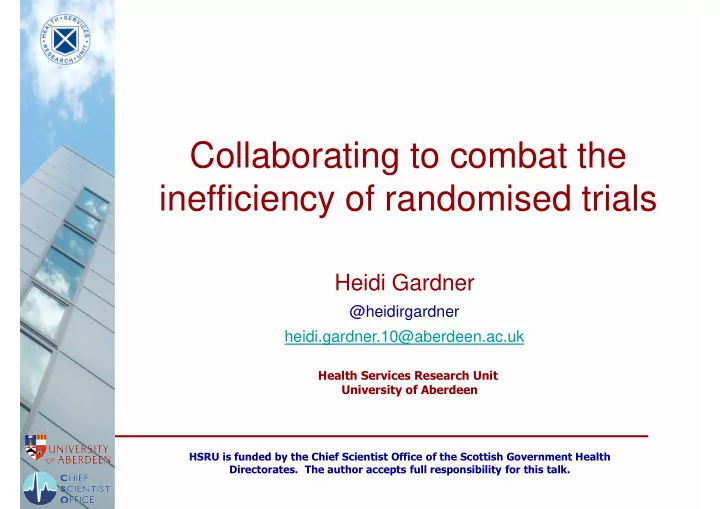

Collaborating to combat the inefficiency of randomised trials Heidi Gardner @heidirgardner heidi.gardner.10@aberdeen.ac.uk Health Services Research Unit University of Aberdeen HSRU is funded by the Chief Scientist Office of the Scottish Government Health Directorates. The author accepts full responsibility for this talk.
What is an efficient trial? • Financial efficiency: use of resources – technology, staff • Scientific efficiency: establishing need, the ‘right’ question, optimal design • Regulatory efficiency: the ‘amendment cascade’, repetition in approvals documentation • Integration of knowledge: at the beginning – PPI, multiple stakeholders, at the end – dissemination to the research community and healthcare providers, public engagement • Process efficiency: recruitment, retention, data collection
Trials = Data • Approximately 25,000 trial results published every year 1 • The number of things we measure is increasing 2 • Data collection takes time and effort – patient burden as well as staff • Data management accounts for a lot of work; one estimate is that over a third of hours spent on a trial is spent by Data Managers 3 1. Bastian et al. PLoS Med. 2010; 7: e1000326 2. Getz et al . Am J Ther. 2008; 15: 450-7 3. O’Leary et al. Clinical Trials. 2013; 10: 624-32
Are these data informing decisions?
Are these data informing decisions?
What are we collecting and why? • Primary/secondary outcome data, health economics outcomes, process outcomes, compliance data, participant identification, eligibility, demographics, safety data, data management items • Where do we invest our time when collecting outcome data? • Do we spend most of it on our most important outcomes? • Project led by Prof Shaun Treweek, Aberdeen and David Pickles, Leeds
Ongoing international trial: Time 3% on primary 12% on biomarkers Primary = 81 hours Biomarker = 324 hours Secondaries = 2265 hours Total = 2670 hours 85% on secondaries A working year? ~1725 hours
Ongoing international trial: Cost 3% on primary 12% on biomarkers Primary = £2,106 Biomarker = £8,424 Secondaries = £58,890 Total = £69,420 85% on secondaries A research nurse in Grampian costs around £26 per hour
Let’s look at a bigger sample • Random selection of 115 protocols for publicly funded RCTs published between 2010 and 2014 (~24 per year) • Primary and secondary outcomes extracted from protocols • Data on time to complete each outcome sought from protocol, corresponding authors, or Trial Managers familiar with the outcome • We’ve looked at 20 trials so far
A sample of 5 trials Hours Trial ID
A sample of 5 trials Hours Trial ID
..and for 20 trials Hours Trial ID
..and for 20 trials Hours Trial ID
Primaries and secondaries: Median time and cost 14% on primary Primary 68 hours / £1,785 Secondaries 417 hours / £10,946 Total 485 hours / £12,731 86% on secondaries
A ratio to remember Median ratio of time spent on primary vs secondary outcomes
What is Trial Forge? • Collaborative project • Identify processes • Collate what we know • Spot gaps • Do work to fill those gaps • Disseminate
Thank you! Special thanks to Prof Shaun Treweek, Aberdeen & David Pickles, Leeds @Trial_Forge www.trialforge.org HSRU is funded by the Chief Scientist Office of the Scottish Government Health and Social Care Directorates. The author accepts full responsibility for this talk.
Recommend
More recommend